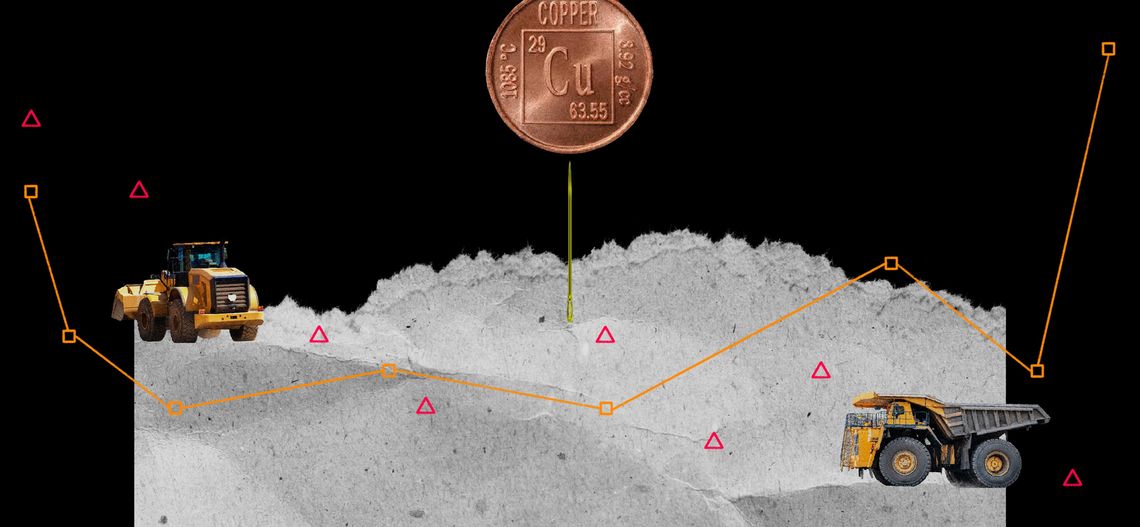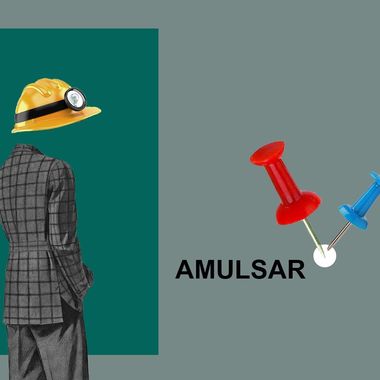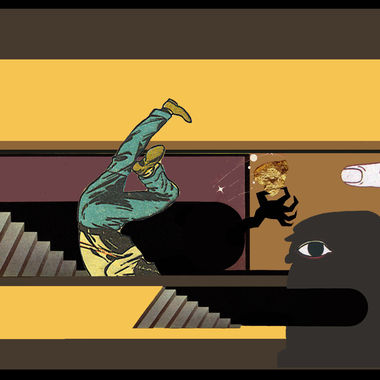
Illustration by Armine Shahbazyan.
In Armenia, companies take pride in being among the top taxpayers in the country. But that doesn’t necessarily mean that they welcome new tax hikes. The Zangezur Copper-Molybdenum Combine (ZCMC), based in Kajaran, Syunik, was Armenia’s third-largest taxpayer in 2020, contributing 41,689,281,000 AMD ($83 million) to the state budget. During the recent election campaign, the company has also been heavily politicized for its association with Vahe Hakobyan, former regional governor of Syunik and senior member of the Armenia Alliance, which came in second to Nikol Pashinyan’s Civil Contract Party on June 20. Kajaran was the only major city in the whole country where a party other than Civil Contract received more than 50% of the vote, and pressure from ZCMC on its employees is considered a major factor in that result.
In this context, the imposition of a new tax that targets the company can be viewed as a form of political retaliation. On July 15, 2021, a rushed procedure pushed Bill G-1007 through both necessary readings in parliament within a 24-hour period. Although the June 20 election had already taken place, it was passed by the previous parliament before new MPs were sworn in on August 2.
The bill introduces three new export taxes on copper concentrate, molybdenum concentrate and ferromolybdenum, which are all production outputs of ZCMC’s operation. As the world economy nears a post-COVID phase, the price of copper has experienced a sharp rise, hitting $9,500/ton, up 50% from January 2020. Likewise, molybdenum, a metal used to strengthen steel, has risen from $19,000/ton in August 2020 to $42,000/ton a year later. The Justification section of the bill cites these price increases and reasons that the state should claim its share of the windfall. According to government calculations, the use of this measure will contribute around 35 billion AMD ($70 million) to the state budget. Minister of Economy Vahan Kerobyan also reasoned that tightening the suddenly-enlarged profit margin will maintain the incentive to invest in new technology, increase the mine’s productivity, and even complete more of the refining process domestically.
The new taxes will take the form of export licenses that cost:
-
160,000 AMD per ton of copper concentrate.
-
800,000 AMD per ton of molybdenum concentrate
-
1,000,000 AMD per ton of ferromolybdenum
However, due to Armenia’s commitments to the Eurasian Economic Union (EAEU), they will not apply if the raw materials are being shipped to EAEU member countries. The proposal is a stop-gap measure and seen as a short-term solution to the government’s pressing fiscal needs. In the long-term, a more comprehensive review of the country’s overall tax policy will be undertaken to address the needs of Armenia’s post-war reality.
According to the Armenian Statistical Committee, the country’s total exports (of all goods) in 2020 amounted to $2.5 billion. Copper and molybdenum ore represent a sizeable chunk of this economic output. Copper concentrate made up $604.4 million (a 3.6% decrease from 2019), molybdenum concentrate totaled $103.7 million (an 82.7% increase from 2019), and ferromolybdenum came to $98.5 million (a 30.8% decrease from 2019). These three products made up 31․8% of Armenia’s gross exports and are critical to maintaining the national balance of payments.
The copper concentrate is mainly exported to Bulgaria, Switzerland, China, Poland, Canada and Georgia. Molybdenum concentrate is exported to China, Belgium, Russia and Chile. Ferromolybdenum is exported to the Netherlands, Russia and Belarus.
It should also be noted that, according to the indicators published by the Statistical Committee, wages in the mining sector are among the highest in the country (at 467,098 AMD/month in May 2021). IT is the only sector to record higher average wages. Mining employs 10,984 people, up 3.3% from last year. At the same time, the level of economic activity of the population in the Syunik region is 69․2%, ranking it second after Armavir.
The ZCMC has a unique impact on these statistics as it is the leading company in mining and processing copper and molybdenum ore. (There are also two other significant players.) It is noteworthy that, at 12․1%, Syunik region has registered the lowest poverty rate in Armenia. That achievement is mainly due to the high level of average wages in the mining sector, which exceed the average wage in Armenia by about 2․5 times.
The fates of thousands of employees and their families depend on the activities of the company, either directly or indirectly.
In January-June 2021, total exports (of all goods) from the Republic of Armenia amounted to $1.37 billion, an increase of 23.3% compared to the same period of the previous year. The output of the Zangezur Copper-Molybdenum Combine made up about 20%—around $500 million—of Armenia’s total export volume. Therefore, the adoption of Bill G-1007 can be expected to have a direct impact on the activity of the ZCMC. In 2020, mining companies paid about 80 billion AMD ($160 million) to the state budget, 5-6% of total tax revenue.
The bill raises a number of issues. First of all, it is necessary to point out that the Republic of Armenia exports other minerals besides copper and molybdenum (for example, gold), which also have a significant share in the structure of Armenia's exports. Yet the tax hikes do not apply to them. In addition, the Justification section of the bill presents statistical indicators related to non-ferrous metals and their concentrates for 2018-2020; however, a longer-term analysis should have been conducted.
It should also be noted that the tax increase is based on the sharp rise in international commodity prices and the inefficiency of the current system of royalties. But, when international prices of these metals registered a sharp decline (for example, in 2016) and the mining companies increased their credit liabilities, the government did not take countermeasures at that time to alleviate the situation. Besides that, as of January 1, 2020, the Armenian government reduced the profit tax of large businesses, including mining companies, by 2%, setting it at 18%. The reasoning at the time was that the reduction of tax rates will encourage new investments and help the economy develop. While reducing the tax burden for large businesses, the government increased excise taxes on alcohol, tobacco, gasoline and diesel, in effect shifting the tax burden from large companies onto “vice” sectors it wanted to discourage. In other words, creating a new tax in the form of an export licence contradicts the authorities' previous tax philosophy.
It is noteworthy that Russia and Chile, which produce and export non-ferrous metals, have also both revised their tax policy this year, and increased their own tax burdens. Chile in particular has adopted a progressive tax policy, under which mining companies will pay a royalty of 15-75%, an effective doubling of the tax burden. According to calculations done by Bloomberg, in Latin American countries such as Mexico, Peru and Chile, the tax burden for copper exceeds 40%. To compare, Bill G-1007 would take Armenia roughly from 15% to 30%.
In conclusion, the tax revenues flowing from the mining sector to the state budget did need to be increased to ensure a fair distribution of income within society. However, a progressive approach, where those with the highest incomes pay a larger share, would have been a preferable approach. The export tax introduced in Bill G-1007 makes no consideration as to the profitability of the company, nor was it designed to adjust as market prices fluctuate. It places a burden on a sector that is critical to Armenia’s balance of payments and was implemented with an unwelcome urgency that reduces regulatory certainty for potential investors. If prices fall and producers (ZCMC and others) cut back production, the impact on Armenia’s overall exports would suffer, and the revenues that the Government expected to fill its coffers might never materialize.
More on Mining in Armenia
Corruption Risks in Armenia’s Mining Sector
By Artur Grigoryan
Serious issues in the country’s mining sector is something this new government inherited from the former regime. Artur Grigoryan argues, however, that enough steps have not been taken to eradicate or even curb corruption in the sector.
Reforming the Armenian Mining Sector: Civil Society Stands Up to Be Heard
By Varant Meguerditchian
Mining has a potential to play a significant role in Armenia, however current gaps in legislation and poor monitoring and assessment presents many risks.
The Mine and the People: Residents of Vayots Dzor Determined to Find an Alternative to Mining
By Gohar Abrahamyan
For the past year, activists and residents of Vayots Dzor have blocked roads leading to the Amulsar Gold Mine. Gohar Abrahamyan speaks with some of the protesters, all residents of nearby towns and villages, who are manning the posts.
Mining and the Protection of Human Rights
By Artur Grigoryan
Environmental lawyer Artur Grigoryan writes that many countries, including Armenia, often protect the financial interests of mining companies and their shareholders more than the vital human rights of their own citizens.
Podcast








